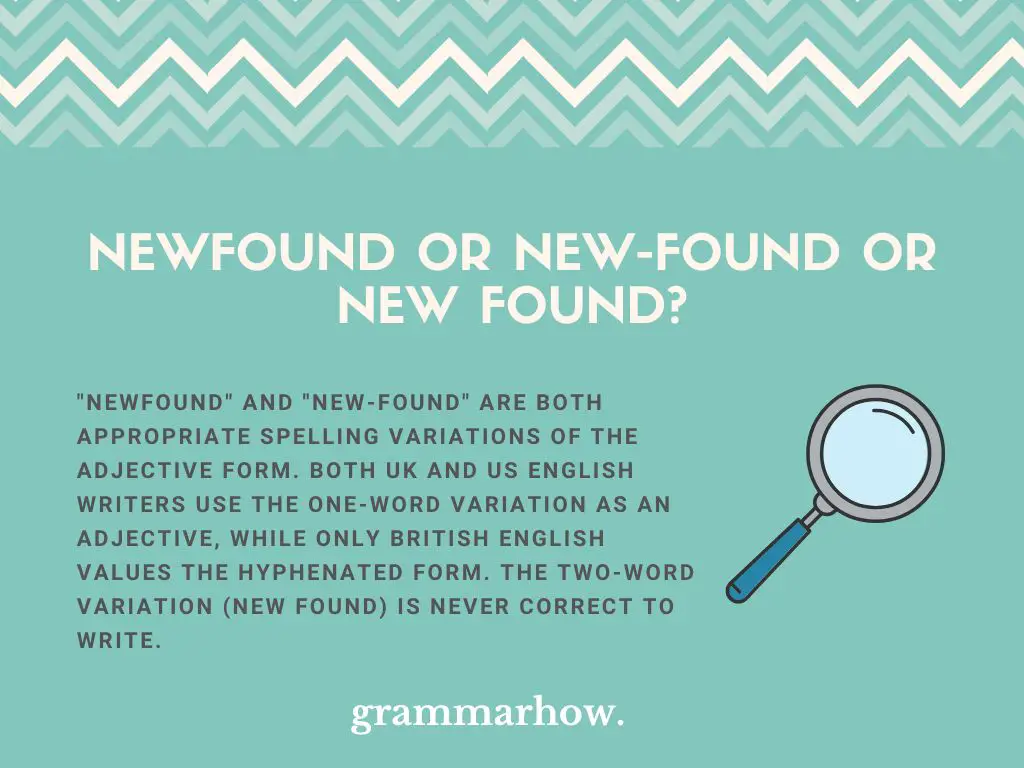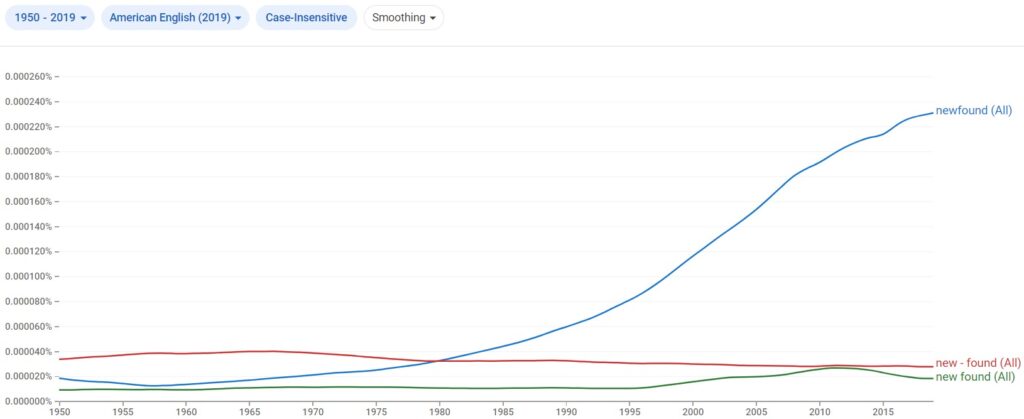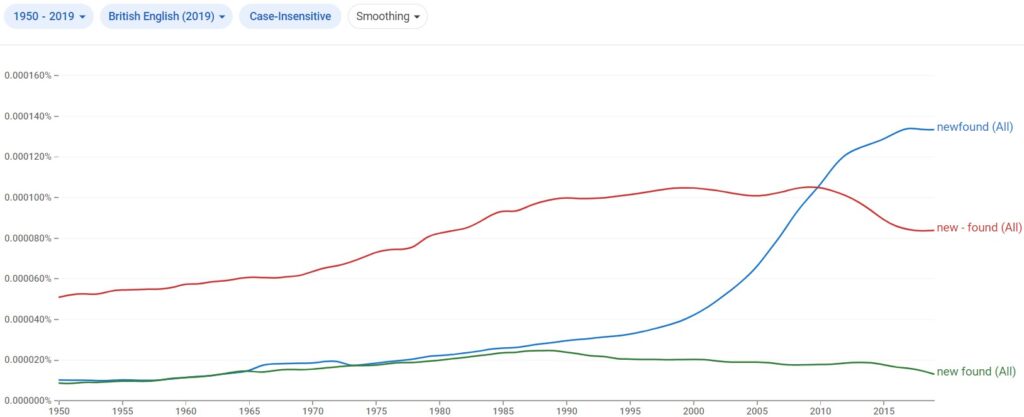Figuring out how to correctly hyphenate, close, or open an adjective can be tricky. You need to know some rules for hyphenating a compound word correctly. Luckily, this article will help you understand how to spell “newfound” in your writing.
Newfound or New-Found or New Found?
“Newfound” and “new-found” are both appropriate spelling variations of the adjective form. Both UK and US English writers use the one-word variation as an adjective, while only British English values the hyphenated form. The two-word variation (new found) is never correct to write.

You may also refer to the AP Stylebook when learning about hyphens. According to AP Style, you should hyphenate two or more adjectives when they modify the same noun in a sentence, and the reader can still determine the meaning.
So, if “new” and “found” come before a noun, you would need to hyphenate them into a compound adjective. For example:
- New-found respect
This hyphen shows that “new-found” is correct to use as a compound adjective.
The Chicago Manual of Style also allows you to remove the hyphen from compound words if the meaning is still clear. You can turn “new-found” into the simpler “newfound” form when writing it in this way.
Most writers prefer the one-word option because it’s quicker to write and more concise for the reader.
Newfound or New-Found or New Found in the UK vs. US?
We’ve briefly touched on the geographical differences of the words, but it’s worth seeing some evidence of that. We’ve gathered some information to help you see whether the one-word or hyphenated option is best.
According to Google Ngram Viewer, American English users value “newfound” above any other form. This shows that it’s the best choice for an American English writer. The hyphenated and two-word forms are barely used.

British English users also prefer “newfound,” but only as of the last decade. Before then, the hyphenated form was much more popular, showing that both forms are correct in British English.

If you wanted to go further afield, you could look into the rules for Australia and Canada as well. Both Australian and Canadian English writers tend to follow British English rules. Therefore, “newfound” and “new-found” are both acceptable, but “newfound” is more popular.
All in all, “newfound” is the best form across all forms of English, making it the most suitable choice for your writing.
Is “Newfound” One Word?
“Newfound” is most commonly written as one word. You may drop the hyphen completely in favour of this simplistic spelling which helps both readers and writers alike.
It’s common for English to evolve and make words like “new-found” easier by removing unnecessary characters. It’s not the first time that a one-word compound adjective has surpassed the hyphenated form as English evolves.
Here are a few examples to show you how to use “newfound” in a sentence:
- I have a newfound respect for anyone that can keep up with the news today. It’s always just filled with mass panic.
- There’s a newfound exhibition relating to all the findings they discovered while they were abroad. It’s very interesting.
- You need a newfound hobby to get you through something like this. I doubt you’ll be able to keep this up forever.
- He has newfound fame. Don’t try to talk to him right now. He’s still coming to terms with the whole thing. It’s a lot.
- I have a newfound respect for you. I don’t know what’s led me down this road, but I’m very proud of you.
Is “New found” Two Words?
“New found” should never be written as two words. You must group the two words if you’re trying to modify a noun. Leaving the words ungrouped or unhyphenated means you cannot modify the noun that comes after “new found.”
There are no exceptions here, either. “New found” is never grammatically correct.
These examples will show you how to use the correct variations:
- Correct: Her new-found fortune should be coming in anytime soon. I can’t wait to see what she’s going to do with it.
- Incorrect: What’s the point of all this new found fame if you’re not going to do anything with it? I don’t get you.
- Correct: The newfound respect I have for you is off the charts. Seriously. I’m proud of the person you’ve turned into.
- Incorrect: I will not talk about the new found discoveries around them. There’s not much point in me talking about them.
Is “New-found” Hyphenated?
It is traditionally accepted to hyphenate “new-found.” AP Style rules suggest hyphenating adjectives when they modify the same noun in the sentence. The hyphen helps a reader to understand where the modification comes from.
You may choose between hyphenating or grouping “new-found.” Both are correct. Just make sure you stick to one form. You don’t want to use both in your writing.
Check out a few of these examples to see how to use “new-found” in a sentence:
- He has new-found confidence with that haircut. I’ve never seen his smile shine so bright. He lights up entire rooms.
- What’s this new-found fame going to get for me? I wish there was some way for me to act on this and make it count.
- She has new-found glamour in her eyes. I think they gave her a great makeover. She looks remarkable.
- I have a new-found respect for my mother. I had no idea how hard it was to raise a baby until this moment.
- Your new-found freedom must be a lot to take in. Make the most of it while you’re still able to!
Tip to Remember the Difference
“New-found” and “newfound” are both correct. However, “newfound” is the most popular choice, so a quick tip wouldn’t go amiss.
“Newfound” is the newfound spelling variation of “new-found.” You should drop the hyphen because English has evolved and found a new way to spell the word. The one-word option is the newfound form.
Final Thoughts
“Newfound” and “new-found” are both correct compound adjectives. You may use them to modify a noun, though it’s wise to stick to one form throughout your writing. “Newfound” is more popular in both UK and US English. “New found” is never correct as two words, though.

Martin holds a Master’s degree in Finance and International Business. He has six years of experience in professional communication with clients, executives, and colleagues. Furthermore, he has teaching experience from Aarhus University. Martin has been featured as an expert in communication and teaching on Forbes and Shopify. Read more about Martin here.
